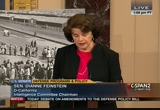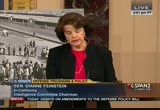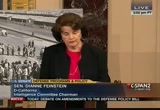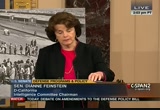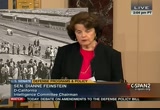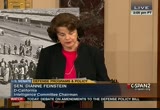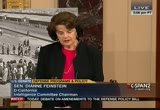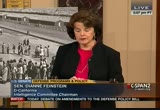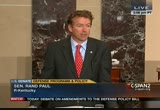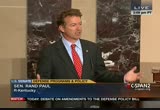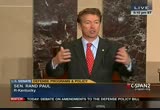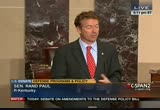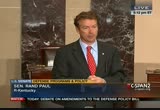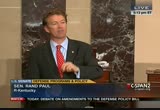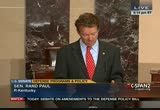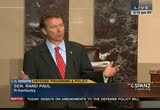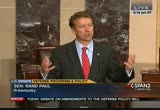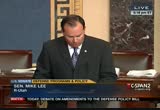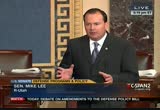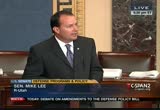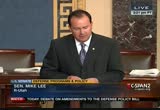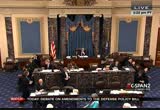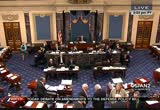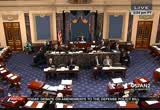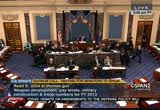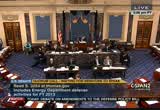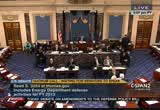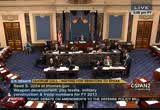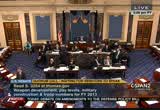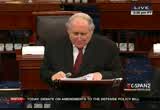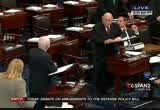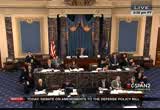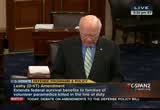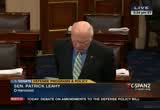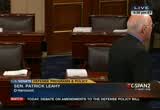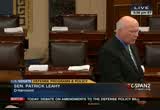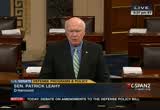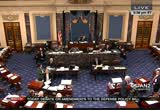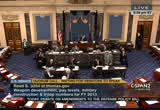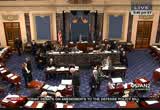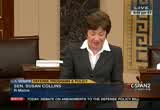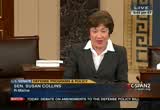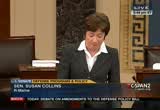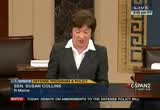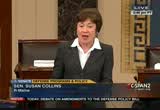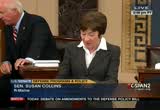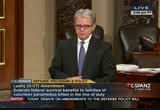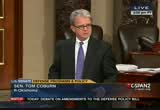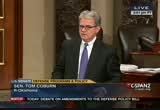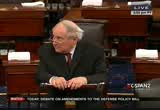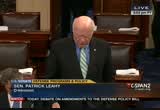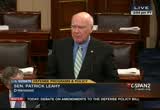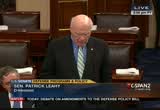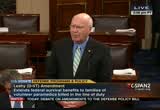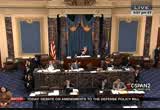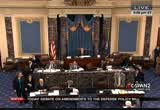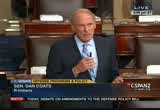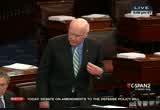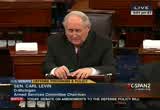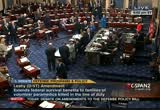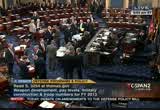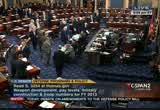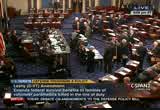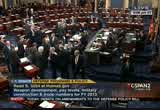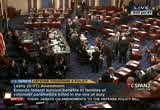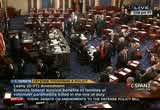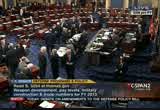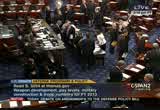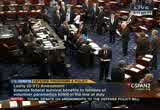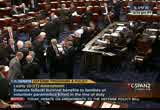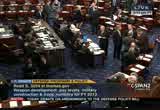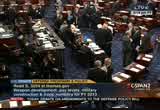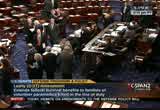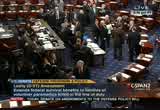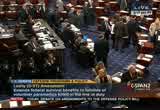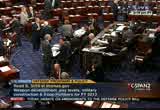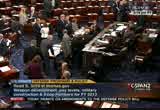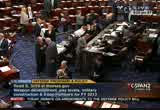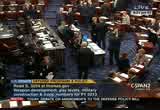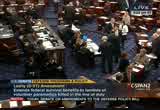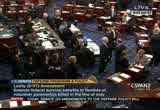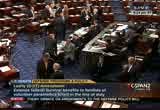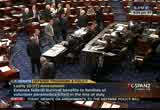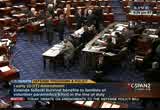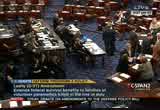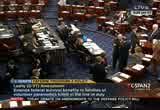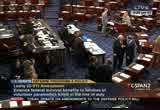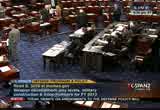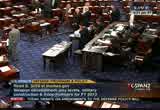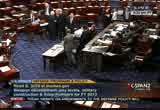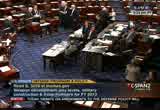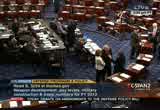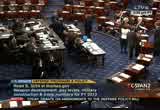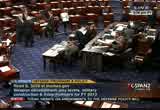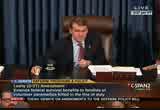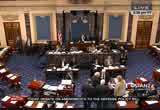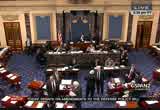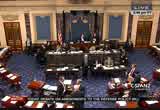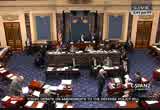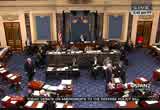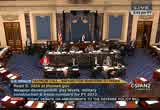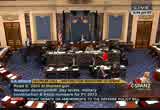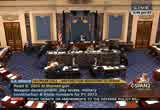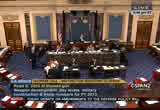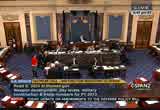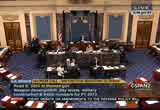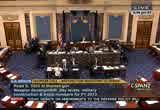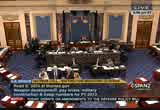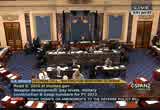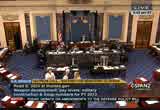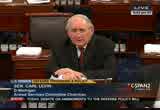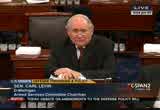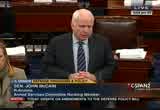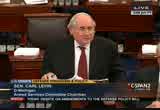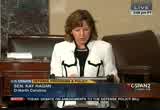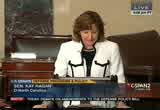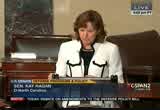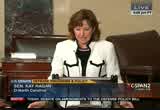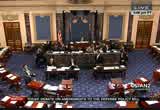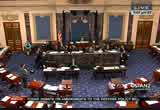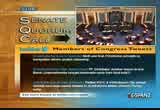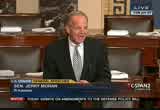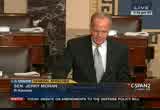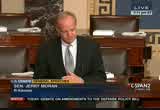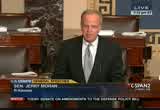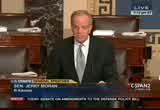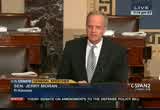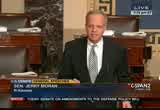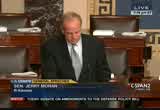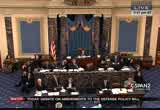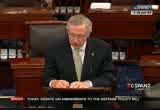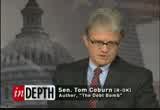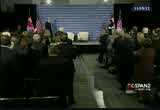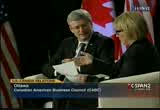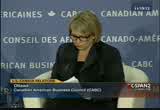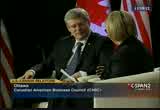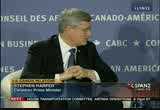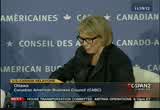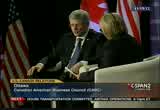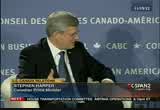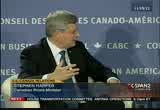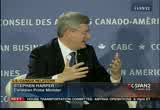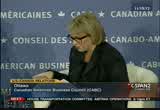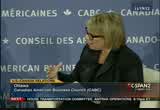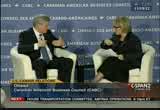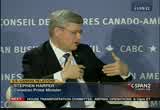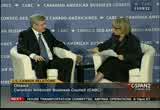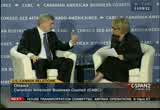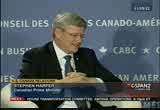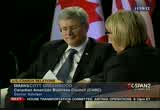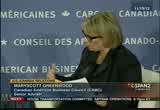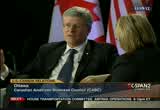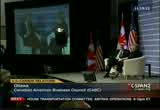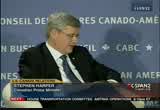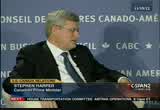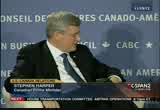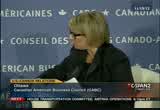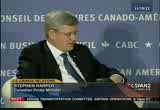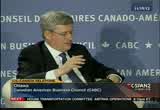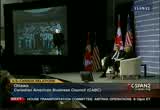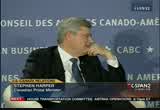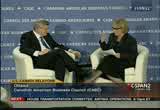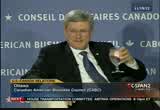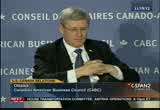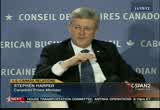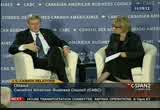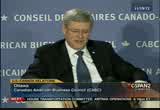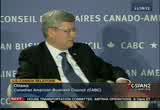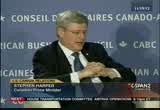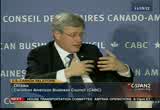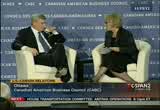tv U.S. Senate CSPAN November 28, 2012 5:00pm-8:00pm EST
5:00 pm
the detention of united states citizens or lawful resident aliens of the united states or any other persons who are captured or arrested in the united states." now, that was just sort of to say, leave things as they are right now. it preserved the current state of the law, continuing to leave it to the courts to resolve who is right about whether or not the aoumf authorizes the military detention of united states citizens who are apprehended domestically. i believe strongly that the time has come now to end this legal ambiguity and to state clearly once and for all that the aumf or other authorities do not authorize such a definite detention of americans apprehended in the united states. this is without charge or
5:01 pm
without trial for year after year after year. to accomplish this, we are offering an amendment which affirms the continuing application of the principles behind the nondetention act of 1971. it amends that act to provide clearly in a clear statement that no military authorization allows indefinite detention of united states citizens or green card holders who are apprehended inside the united states. the amendment states an authorization to use military force, a declaration of war or any similar authority shall not authorize the detention without charge or trial of a citizen or lawful permanent resident of the united states apprehended in the united states unless an act of congress expressly authorizes
5:02 pm
such detention. that affirms the second circuit's clear statement rule from the padilla case. now, some may ask why this amendment protects green card holders as well as citizens and others may ask why the amendment does not protect all persons apprehended in the united states from indefinite detention. let me make clear i would support providing the protections in this amendment to all persons in the united states, whether lawfully or unlawfully present, but the question is is there enough support in this body to expand this amendment to cover others besides united states citizens and green card holders? i do not believe there is. we got 45 votes last year. we have gained support this year. and so my hope is that at least we can clear the law with a
5:03 pm
clear statement on citizens and legal resident aliens. now, wherever we draw the line on who should be covered by this legislation, i believe it violates fundamental american rights to allow anyone apprehended in the u.s. to be detained without charge or trial. the f.b.i. and other law enforcement agencies have proven time and time again that they are up to the challenge of detecting, stopping, arresting and convicting terrorists found on u.s. soil. having successly arrested, -- successfully detained, arrested, convicted hundreds of these heinous people both before and after 9/11. for example, since january, 2009, 98 individuals have been successfully arrested inside the united states by the f.b.i. and
5:04 pm
other federal or local law enforcement officers on terrorism-related charges. last month, staff of the senate intelligence committee compiled a list of the 95 individuals arrested in the past four years as part of more than 50 different terrorism investigations. the list was based on publicly available information from the f.b.i., the congressional research service and media reports. and i have it here and i would like to enter that list into the record. the presiding officer: without objection. mrs. feinstein: thank you very much. it is also important to understand that suspected terrorists who may be in the united states illegally can be detained within the criminal justice system, using at least the following four options. one, they can be charged with a
5:05 pm
federal or state crime and held. two, they can be held for violating immigration laws. three, they can be held as material witnesses as part of federal grand jury proceedings. and four, they can be held under section 412 of the patriot act for up to six months. i want to be very clear about what this amendment is and what it's not about. it's not about whether citizens such as hamdi and padilla or others who would do us harm should be captured, interrogated, incarcerated and severely punished. they should be. but what about an innocent american? what about someone in the wrong place at the wrong time, with the wrong skin color? the beauty of our constitution is that it gives everyone in the united states basic due process rights to a trial by a jury of their peers.
5:06 pm
that is what makes this nation great. as justice sandra day o'connor wrote for the plurality in hamdi v. rumsfeld, and i vote -- "as critical as the government's interest may be in detaining those who actually pose an immediate threat to the national security of the united states during ongoing international conflict, history and common sense teach us that an unchecked system of detention carries the potential to become a means for oppression and abuse of others who do not present that sort of threat." i mean, just think of it. if you were of the wrong race and you were in a place where there was an attack, you were picked up, you could be held without charge or trial month after month, year after year,
5:07 pm
that's wrong. experiences over the last decade prove the country is safer now than before the 9/11 attacks. terrorists are behind bars. dangerous plots have been thwarted. the system is working, and hopefully improving each day. so i think now is the time to clarify united states law to state unequivocally that the government cannot indefinitely detain americans and green card holders captured inside this country without trial or charge. the federal government experimented with indefinite detention of united states citizens during world war ii, a mistake we now recognize as a betrayal of our core values. let's not repeat it. i urge my colleagues to support this amendment, and i yield the
5:08 pm
floor to senator paul. mr. paul: mr. president? the presiding officer: the senator from kentucky. mr. paul: i rise today in support of senator feinstein's amendment. i compliment her on her work. and i also echo the importance of the right to trial by jury. in fact, i'm appalled that anyone would think that we could arrest anyone in our country without charging them and giving them a right to a trial. it seems so fundamentally un-american. i agree with her also that i think the supreme court would apply this to anyone. our amendment will say citizens and permanent residents, but i think the supreme court, if challenged, will uphold the right to trial by jury of anyone within the united states. today, we will either affirm the right to trial by jury or restrict it. today we will vote to affirm the sixth amendment to the constitution or we will spurn it. today we will vote to affirm 800
5:09 pm
years of history beginning with the magna carta or we will relinquish or at the very least diminish a right that jefferson referred to as the only anchor yet imagined by man which a government can be held to the principles of its constitution. the right to trial by jury was a check on oppressive government. opponents of the right to trial by jury will come today and they will argue that the american homeland is now a battlefield and that we must circumscribe our right to trial by jury to be safe from terrorists. but if we give up our rights, have not the terrorists won? if we let fear relinquish our rights, if we relinquish our rights because of fear, what is it exactly then we're fighting for? we are asked to relink issue our rights because the battlefield is limitless. it is although not a temporary
5:10 pm
suspension they are asking for and they request this because they also say the battle is without limit. this is not a war that is going to end nor is it right that they will suspend temporarily. they are asking you to relinquish your right to trial by jury for the rest of this limitless war. those senators who would propose limiting the right to trial by jury, they would reflect and demur that everyone would still have a habeas hearing. a habeas hearing is important. you must present the body and a judge must say why are you holding this person. but it's not the end of due process. it's the beginning of due process. a habeas hearing isn't the end of due process. it's the beginning. we must still have a trial by jury or we do not have the due process that our founding fathers fought for. those senators who would abridge this and say a habeas hearing is enough should rather blackstone's admonition. every new try biewnl erected for the decision of facts without the intervention of a jury is a
5:11 pm
step towards establishing aristocracy, the most oppressive of absolute governments. we are told that we can't do this, we have to put these people outside of the constitutional courts, that somehow we need something beyond the constitution, that the constitution is not abc 7 enougo convict terrorists. yet hundreds of terrorists have been convicted. in fact, two terrorists in my small town of bowl green, kentucky, were apprehended, tried and convicted for life for terrorism. we can do it. we are told that only terrorists associated with al qaeda will be applied to. we will only take away the right to trial by jury if they are part of al qaeda. but part of the security apparatus also tells us to know your neighbor, know your neighbor so you can report your neighbor. in fact, we are told by the government some of the characteristics that might make you a terrorist. we are told by the department of justice that if you have stains on your clothing, that if you
5:12 pm
are missing fingers, if you changed the color of your hair recently, that if you prefer to pay in cash, that if you own weatherized ammunition, that if you own multiple guns, you might be a terrorist, that your neighbor should report you. do we really want to relinquish our right to a trial by jury if the characteristics of terrorism are wanting to pay by cash? in missouri, they had fusion centers, they are supposed to accumulate information about terrorists and sort of assimilate federal and local and have better communications. sounds good. i'm all for better communications. before 9/11, we did mess up, we didn't communicate well. but from this fusion center comes a document that says beware of people who have bumper stickers supporting third party candidates. beware of people who believe in stricter immigration laws. beware of people who support the right to life. they might be terrorists. this is an official document. do we want to give up the right to trial by jury when we're
5:13 pm
being told that somebody who keeps food in their basement might be a terrorist? am i the only one who fears the relining wishing -- relinquishing of a right that we have had for 800 years? am i the only one who fears that a terrorist might be someone who you might describe as someone who is a constitutionalist? this is an ancient right. the trial by jury we have had since -- virtually since the beginning of our historic times. the greeks and the romance had a form of right to trial by jury. in 725 a.d., morgan of glamorgan, the prince of wales said for the christ and his 12 apostles were to so judge the world so human tribunals would be composed of 12 wise men. we have been doing this for hundreds upon hundreds of years. we saw it as a way to check the oppression of the king but also to check the oppression -- the potential oppression of government. england and america have for centuries prized this right to trial by jury. it seems a shame to scrap it
5:14 pm
now. our founders believe so firmly in the right to trial by jury that they enshrined it in the body of the constitution, again in the sixth amendment and again every state of the union has within the body of its constitution the right to trial by jury. it seems a shame to scrap it now. churchill proudly remembers our joint devotion to trial by jury. he writes we must never cease to proclaim in fearless tones the great principles of freedom and the rights of man which are the joint inheritance of the english-speaking people and which the magna carta in 1215, through the bill of rights, through habeas corpus, through the right to trial by jury and the english common law find their most famous expression in the declaration of independence. senator lafollette, a famous senator from wisconsin, put it
5:15 pm
well. he said let no man think that we can deny civil liberty to others and retain it for ourselves. when zealots of the government, agents of the government arrest suspects or radicals without warrants, hold them without trial, deny them access to counsel or admission of bail, we have shorn the bill of rights of its sanctity. today we have a chance to reaffirm our belief in the right to trial by jury. we have a chance to replace fear with confidence, confidence that no terrorist and no country will ever conquer us if we remain steadfast, steadfast to the principles of our founding documents. we have nothing to fear except our own unwillingness to defend what is naturally ours, our god-given rights. we have nothing to fear that should cause us to relinquish our rights as free men and women. i urge my colleagues to reject fear, to reject the siren call
5:16 pm
for ever more powerful government. justice white put it well when he said a right to a jury trial is granted criminal defendants in order to prevent the oppression of government. it's not just about a fair trial. it's about checking your government. this vote today is about more than just combating terrorism or a fair trial, it's about relinquishing the right to the checks and balances, to the checks that cause and help us to check the releptdless growth of government. it is about whether a free people are willing to remain steadfast in defense of an 800-year-old right that finds justice for the accused and provides restraint and limits on despotism. i hope my colleagues will today vote against limitations on the trial by jury, recognize its sanctity and recognize the importance of something that brings members from the right side of the aisle together with members of the left siel of the
5:17 pm
aisle who believe strongly in the defense of the bill of rights. thank you, mr. president. i yield back my time. a senator: mr. president? the presiding officer: the senator from utah. mr. lee: mr. president, i rise today to speak in favor of the feinstein-lee amendment to the national defense authorization act. at the outset i'd like to note that this amendment is the product of bipartisan discussion and collaboration on an issue that's important to all americans. i'm pleased to have been a part of that process. senator feinstein and i have worked closely together over the course of the past year to craft what we believe represents a very prudent course in protecting both our nation and our liberties at the same time. security is important. and precisely because it's important, it must not be acquired at the expense of our individual liberty. it may well be said that government's most important basic responsibility is to
5:18 pm
protect the liberties of its citizens. our nation has fought wars on american soil and around the world in defense of individual liberty. and we must not sacrifice this most fundamental right in pursuit of greater security. especially when we can achieve security without compromising liberty. the feinstein-lee amendment does precisely that. it protects liberty by ensuring that no american will be deprived of due process. the fifth amendment states that no person shall be deprived of life, liberty, or property without due process of law. the sixth amendment likewise guarantees that individuals accused of a crime will have access to an attorney and access to a trial by a jury consisting of that person's peers. our amendment protects those rights and provides an authorization to use military force, a declaration of war, or any similar authority shall
5:19 pm
not authorize detention without charge or trial of a citizen or lawful permanent resident of the united states apprehended in the united states. now, it's important to note that the supreme court has never specifically held that an authorization for the use of military force somehow authorizes the indefinite detention of a u.s. citizen or a u.s. person apprehended within the united states. and i don't think that we should break new ground here. i don't think we should start opening that precedent and suggest that is somehow acceptable. the constitution does in fact require nothing less than traditional due process for all americans apprehended within the united states. as supreme court justice antonin scalia has written, the gist of the due process clause was to force the government to follow common law procedures, traditionally deemed necessary before depriving a person of
5:20 pm
life, liberty or property. when a citizen was deprived of liberty because of alleged criminal conduct, those procedures typically required committal by a magistrate followed by indictment and trial. i understand and respect, of course, the fact that we live in perilous times. we, unfortunately, as americans have enemies, not only around the world but even within our own borders. this is unfortunate. this creates challenging times for us. and i hope and pray every day that we will be successful in fending off those who would harm us, those who hate our way of life and everything about us and will do everything in their power to destroy us and our liberty. but that does not, it cannot, it will not mean that we as americans surrender our basic instinct to be free. we must stand behind our
5:21 pm
225-year-old founding document as it's been amended to ensure our liberty isn't taken away from us. to give us a path to providing for our security without jeopardizing the freedom that our american citizens cherish so much and have fought so hard and so long to protect. granting the united states government the power to deprive its own citizens of life, liberty, or property without full due process of law goes against the very nature of our nation's great constitutional values. this amendment, the feinstein-lee amendment, protects those values. i urge my colleagues to support it. thank you, mr. president. the presiding officer: the
5:22 pm
5:23 pm
a senator: mr. president? the presiding officer: the senator from california. mrs. feinstein: i ask the quorum call be vitiated. the presiding officer: without objection. mrs. feinstein: i ask that senator baucus are added as a cosponsor of my amendment, 3018. the presiding officer: without objection. mr. feinstein: i also ask a u.c., dorothy engelhart from my office be granted floor privileges during the remainder of the debate on this pill. the presiding officer: without objection. mrs. feinstein: thank you. i yield the floor. i note the absence of a quorum. the presiding officer: the clerk will call the roll.
5:30 pm
mr. levin: mr. president, i ask unanimous consent that further proceedings under the quorum call be dispensed with. the presiding officer: without objection. mr. levin: i ask it be in order for senator leahy to call up amendment 2955 and the time until 6:00 p.m. be equally divided in the usual form, that at 6:00 p.m. the senate proceed to a vote in relation to the leahy amendment number 2955, further, that there be no amendments in order to the leahy amendment prior to the vote. the presiding officer: if there is no objection and i hear no objection, it is soid so ordered. mr. mcconnell: i'd just like to engage in a conversation with my colleague, the distinguished chairman. is it our intention to continue
5:31 pm
to consider amendments following this amendment? and i don't whether there is a possibility of votes or not, but isn't it correct to say that we consider amendments and will try to dispose of them, given the limited time that we have to consider the bill? mr. levin: it would be my hope that after this vote that we would be able to clear amendments perhaps and to have senators debate amendments, and i know that senator coburn will be here between now and 6:00 to debate the leahy amendment, and we don't need to protect him further since the time is equally divided and he can have part of the half-hour time. but it is my hope that people who want us to dispose of amendments will come here after the 6:00 vote and bring these amendments to our attention, see if our staffs can make progress, clear amendments, maybe package
5:32 pm
some votes for tomorrow morning. we can make progress after this vote if our colleagues will cooperate with us. mr. mccain: thank my friend, and i do not object. the presiding officer: without objection, so ordered. mr. leahy:man, i call up amendment 2955. officer the clerk will report. the clerk: mr. leahy proposes an amendment numbered 2955. mr. leahy: i ask unanimous consent further reading be dispensed with. the presiding officer: without objection. mr. leahy: mr. chairman, i also ask unanimous consent that the floor privileges during this vote and subsequent votes on the bill be granted to bruce cohen, mattvergus and erica chaff he ia chavez from my office. the presiding officer: without objection. mr. leahy: this is actually a simple amendment. it strengthens the public safety
5:33 pm
officers benefit act. that's the federal death and disability program that we have for our nation's first responders who are killed or disabled in the line of duty. there'sing in -- it is nothing now this body. an earlier version of this legislation was adopted on the senate floor by voice vote in december 2001. it was adop adopted as part of e f.a.a. modernization and safety improvement act. and in fact the house judiciary chairman, the distinguished member of the house, congressman lamar smith of texas, and i worked on other parts so that we needed up with an improved bill. we had a modest expenditure of benefits for deserving emergency medical responders, wholesome
5:34 pm
reforms to make the benefit program stronger, more cost-effective and efficient. the most important thing, we had c.b.o., which initially had concern, reviewed it and found this cost nothing. what we're saying, mr. president, since 1974, this country has recognized we have first responders who are killed, disabled in the line of duty. this came from bipartisan legislation. it's always been joined in bipartisan legislation. you have a police officer who is shot in the line of duty. you have a first responder, a firefighter, e.m.s., others who are killed in the line of duty, die as a result of their work in the line of duty, that they would have -- share in the same
5:35 pm
benefits that we provided for the whole country. this just clarifies -- this clarifies it for all first responders. it is hard to think of anybody who could possibly disagree with it. it costs taxpayers nothing. it does what we've always done. and, mr. president, let me tell you a story. before we had this act, before we had this law, when i was a young state's attorney, the police chief of manchester, vermont, responding to a burglary, was shot and killed. now, he was a man who solely supported his wife and aged mother. turned out there was no program at that time -- this is prior to 1974 -- 1976 -- to care for him,
5:36 pm
to care for the wid widow, thers not even money to pay for his funeral. i was president of the vermont state's attorneys association at the time. i started making calls around the state. we quickly raised the money for his funeral. and with some modes for some mos family. i still remember that funeral, mr. president. it was one of those days we often have when in the snowfall when there's very large snowflakes, we call them silver-dollar snow placks, just falling gently out of the sky. on a two-lane road leading to this small church, typical new england steeple on it. for miles and miles, all you saw is snow coming down and the
5:37 pm
reflection of blue lights from the police cars flashing, and the red lights from the firetrucks flashing and the white and red lights from the ambulances flashing. i have never forgotten that. today at least under the federal legislation, if that happened again, there would at least be benefits, as there should be. but this is something that can happen in vermont, in rhode island, or any other state in this country. so, this is an amendment that we passed in the house unanimously, passed here unanimously before, it has no cost to the taxpayers. so, mr. president, i hope it will pass at 6:00 when we vote on it. mr. president, i reserve the balance of my time. i suggest the absence of a quorum, and i ask that the time be equally divided during the
5:38 pm
5:40 pm
ms. collins: mr. president? the presiding officer: the senator from maine. ms. collins: mr. president, i ask unanimous consent that proceedings under the quorum be dispensed with. the presiding officer: without objection. ms. collins: mr. president, i ask unanimous consent that peter halverson, the military fellow from the department of navy, be granted floor privileges for the remainder of consideration of the defense authorization bill. the presiding officer: without objection. ms. collins: mr. president, i ask unanimous consent that senator demint be added as a cosposh of the feinstein-collins amendment number 3018. the presiding officer: without
5:41 pm
objection. ms. collins: thank you, mr. president. mr. president, i rise to speak in support of the amendment offered by senator feinstein. the purpose of our amendment is to make clear that a united states citizen or a legal, permanent resident arrested in this country cannot be detained indefinitely without charge or trial. this amendment is necessary because current law with respect to the indefinite detention of u.s. citizens within the united states remains unclear after more than 11 years of a persistent conflict in which the enemy often does not distinguish itself from civilians. without this amendment, mr. president, it is conceivable
5:42 pm
that an american citizen could be arrested, detained, and held without charge or trial. in order to address this -- the gap in the law, our amendment is needed. last year the fiscal year 2012 lanational defense authorization act defined the scope of the detention authority provided under the 2001 authorization for the use of military force for detainees captured outside of the united states, but the scope of detention authority as it relates to u.s. citizens and lawful residents captured or arrested inside the united states was left nebulous. because of this legal ambiguity,
5:43 pm
despite the guarantees enshrined in our constitution, an american citizen could be indefinitely detained without charge or trial, even if they are detained in the united states with. now, mr. president, i do not believe that many of us intended to authorize such a sweeping detention authority within the united states when we voted to allow our military to pursue al qaeda following the 9/11 attacks. because congress was responsible for authorizing the use of military force in the first place, it is our duty, our obligation, to define carefully the scope of the detention authority that we attended. -- intended.
5:44 pm
if we do not clarify this important issue, the federal courts and the executive branch will be left to substitute their judgment for ours. this amendment specifically addresses the issue of american citizens and lawful, permanent residents detained in the united states and would clarify that it is not the intention of the congress to allow for their indefinite detention. mr. president, let me briefly mention what the feinstein-collins amendment does not do. first, it does not change the ruling in hamdi v. rumsfeld. in that case, the supreme court ruled that an american citizen who wages war against u.s. troops in an active combat zone can be taken into preventive detention mured t in order to kt
5:45 pm
person from continuing to wage wars overseas against american military forces. when an american citizen leaves his country to wage war against his fellow citizens, he relinquishes certain rights otherwise supported by the constitution, and i agree with the court's decision in this case. next, this amendment does not preclude intelligence gathering subsequent to a suspected terrorist being taken into detention. the intelligence gathered from a suspect in the hours or days after his arrest can be vital to preventing further acts of violence or uncovering terrorists networks at home or abroad. this amendment balances the ability to gather this important information with the suspect's rights by providing some flexibility within the
5:46 pm
constitution's bound. for example, it does not circumscribe the existing public safety exception to miranda. this exception permits law enforcement in certain circumstances to engage in a limited and focused unwarranted interrogation and allows the government to introduce the statement as direct evidence in a judicial proceeding. law enforcement officials confronted with an emergency may question a suspect held in custody about an imminent threat to public safety without providing miranda warnings first. in addition, nothing precludes other federal agents from gathering intelligence without providing miranda rights. under current law, a u.s. citizen cannot be tried in a military tribunal, and that does not change under our amendment. finally, this amendment does not
5:47 pm
change the treatment of those who are here on temporary visas, such as students or travelers, the kind of visas that were used by the 9/11 terrorists. mr. president, in closing, let me just talk about how this amendment would have changed the treatment of some u.s. citizens detained under the authorization for use of military force during the last 11 years had it become law. first, because this amendment only covers american citizens captured in the united states, it would not have affected the detention of john walker lin, for example. so the only u.s. citizen affected by this amendment would have been jose padilla. if this amendment were the law, jose padilla's detention would have ended as it did under the bush administration, in a
5:48 pm
federal courtroom where he was charged with aiding terrorists and a terrorist organization. mr. president, since 2001, terrorism has claimed far too many victims both abroad and here in our country. but it's crucially important that in pursuing the war on terrorism, we must assure our fellow citizens their constitutional rights, the very foundation of what makes us americans. for this reason, i am proud to be a cosponsor of senator feinstein's amendment, and i strongly urge its adoption. thank you, mr. president. a senator: mr. president? the presiding officer: the senator from oklahoma. mr. coburn: thank you. i just want to spend a few minutes noting why i am against the expansion of the public safety officers benefits improvement act. and it's a great example for where we find ourselves in our
5:49 pm
country. if you read the constitution and look at the enumerated powers, we have a federal program to benefit what is really the responsibility of states. nobody's going to say that this isn't a beneficial program to those poor families that might need this. and the chairman of the judiciary committee has done a wonderful job in terms of offsetting this so that there's no additional cost. and for that, i congratulate him. but this is a great example of why we're -- have $88 trillion in unfunded liability, $16 trillion in debt, because we're doing a function that is truly the responsibility of the states. the psob program was originally designed, in its original design to be a model so that the states would set up and demonstrate to them how they could extract rally -- structurally set up their own programs. over the last 30 years congress
5:50 pm
has continued to expand this program, and now we spend about $81 million to $85 million a year on this program. and i'm not saying it's not needed money for the families, but we're going to expand a program that is truly not a federal responsibility. and i have no hopes that this will be defeated. i know it won't. but i wanted to raise the question. given what's in front of us, it's one thing to meet the needs under our federal requirements for medicare and medicaid. but when are we going to stop expanding programs that aren't truly our responsibility? the cause is great. it's appropriate for a government agency to help in times for the people who actually put their lives on the line for us. but is it a federal
5:51 pm
responsibility? and the question is, no, it's not. it's a state responsibility. and so as we assume more and more responsibilities for the states with budget deficits in excess of $1 trillion, what we're going to do is find ourselves at a point where we're going to have to make cuts in programs that are our responsibility. so all i would ask to you do is think about whether or not this is truly a responsibility of the federal government and whether or not we ought to be expanding the program -- well-intentioned, does great work. don't discount that. well-deserved. don't discount that. but is it the responsibility of the federal government? i would actually state to the chairman -- and i'd be happy to have a voice vote on this and not force a vote, because i know the outcome, and we shouldn't waste everybody's time to do
5:52 pm
that. so with that, i would ask for the yeas and nays and a voice vote and vitiate the vote that's scheduled for 7:00 -- 6:00. the presiding officer: is there objection to that request? href i'm not sure i -- mr. levin: i'm not sure i understood what that request was. the presiding officer: the request was for a vote on the leahy amendment now -- the senator from tkwra*z. mr. mccain: i will be asking for the yeas and nays at the appropriate time. the presiding officer: objection is heard. mr. leahy: mr. president? the presiding officer: the senator from vermont. mr. leahy: mr. president, it is my understanding that we will be going -- we'll be voting at 6:00. is that correct? the presiding officer: the senator is correct. mr. leahy: and the managers of the bill will be requesting, i understand, will be requesting a
5:53 pm
roll call vote. at least i understand that. mr. president, how much time does the senator from vermont have remaining? the presiding officer: the senator has 7 minutes remaining. mr. leahy: mr. president, i think it's almost time for the vote, but let me note a couple of things here. the distinguished senator from oklahoma has noted in his objection -- i appreciate him doing that, but i also note that we share different views on this. for example, the senator from oklahoma was the lone vote opposing the bulletproof vest partnership grant act of 2012. the bulletproof vest has saved the lives of hundreds, even thousands of our police officers. he opposes the public safety officer's benefit act which provides a federal death benefit to surviving families of first
5:54 pm
responders who are killed in the line of duty. and he's objecting to passage of the bipartisan, bicameral and cost-neutral public safety officers benefits improvement act of 2011 which would make important reforms to a program that has assisted the families of thousands of police officers and other first responders who have lost their lives protecting their communities and fellow citizens. we heard from chuck canterbury, the highly respected chairman of the fraternal order of police, the present fraternal order of police. he's one of our nation's law enforcement leaders. and he wrote to the chairs of both the senate and the house judiciary committees about the distinguished senator's opposition to this cost-neutral
5:55 pm
public safety officers' benefits program reform, and he concluded concluded -- and i quote mr. canterbury -- "fraternal order of police views this not as embracing a principal of federalism, but a ploy between local and state officers that serve at the local level and employees that serve in the federal government. when a police officer puts himself in harm's way, he does not stop to think about jurisdiction. he does not ask the offender if he's committing a local, state or federal crime. he acts in the best interest of the safety of those he's sworn to protect. and a family that loses a loved one in the line of duty should not just be left to drift
5:56 pm
because their loved one was a local firefighter or state trooper and not a federal agent." mr. president, i would hope that the senate would overwhelmingly pass this bipartisan piece of legislation. again, i think back to my own experience in law enforcement as also the experience of senator ben nighthorse campbell from colorado, who first wrote this legislation with me. from his own experience in the sheriffs department in colorado. anybody that served in law enforcement, anybody that served as a volunteer fireman or e.m.s., anybody in any part of this country knows the need for this. the fact that we've been able to do it at no cost to the taxpayer is even better. so, mr. president, i reserve the balance of my time. i ask consent a couple of
5:57 pm
letters -- excuse me. i ask first the letters for the congressional fire service institute, international association of fire chiefs, international association of firefighters, national firefighters protection association, national volunteer fire council and the american association in support of this legislation be made part of the record. the presiding officer: without objection those letters will be made part of the record. a senator: mr. president? the presiding officer: the senator from alabama. mr. sessions: mr. president, just for one minute, i'd like to call up a number of amendments. number 3007, 3008, 3009, 3010, and 3013. the presiding officer: is there objection to -- a senator: 3011.
5:58 pm
the presiding officer: objection is heard. mr. coats: mr. president? the presiding officer: the senator from indiana. mr. coats: i came to the floor because i knew we were going to have a vote at 6:00 and sat down and listened to the dialogue here that was back and forth -- the presiding officer: the republican time has expired under the current order. mr. mccain: mr. president, i ask unanimous consent for two additional minutes for the senator from indiana. the presiding officer: is there objection? without objection. mr. coats: i thank the senator. i wanted to comment that i was listening to the discussion going on here about the leahy amendment. i don't know what the history of all this is, but i simply want to say that i think the senator from oklahoma asked a very legitimate question that we all ought to consider. but i think in consideration of that is, is this legitimately a
5:59 pm
federal responsibility given the fiscal plight that we are in in careening toward the cliff. in deference to his colleagues, the time frame here, he said he understands that it will be virtually unanimous vote, despite his question, which is legitimate. i think we all ought to consider. but that was rejected. the response to somebody, i think, who was trying to be deferential to the senator from vermont and his proposals sort of is put in the position where it looks like he's not trying to be conscious of the situation that exists here. i just think he asked a legitimate question that all of us, given our current fiscal situation, ought to give due consideration to. with that, i yield back and
6:00 pm
thank the senator from arizona. the presiding officer: the senator from vermont. mr. leahy: i would note that this is not an expansion by any means. simply reforms that's already law and adds no cost -- no cost, no federal cost. if i could have the attention of the senator from indiana. this is not an expansion. it is a reform of programs we have. it is of no cost to the federal taxpayers. and, mr. president, i'm willing -- i see the senator from arizona on the floor. i'm perfectly willing to yield back my time and go to the vote if he wishes. mr. mccain: i thank the senator. the presiding officer: the senator from michigan. mr. levin: mr. president, two things. number one, we're going to proceed to a roll call vote in a moment. but i would like, with senator mccain's support and consent, to let our colleagues know that we will be here after this vote. now, that doesn't mean there will be any additional votes
6:01 pm
tonight. that's not up to us to decide. that's a leadership call. but we will be here to try to clear amendments for either voice votes or for votes tomorrow if there's no roll call votes today or for debate. so senator mccain and i are prepared to stay here to receive the amendments that people want to discuss and to see if we can't get some of them cleared and perhaps voice voted tonight. secondly, mr. president, i would ask unanimous consent -- i would ask unanimous consent that the statement that i was intending to make to introduce this bill when we brought it up this morning, which i didn't make because there were amendments that were available, that that -- that those remarks of mine be printed in the record at the beginning of this debate today. the presiding officer: without objection.
6:02 pm
6:37 pm
the presiding officer: are there any senators in the chamber wishing to vote or wishing to change their vote? if not, the vote on this amendment is -- the yeas are 85 and the nays are 11. the amendment is agreed to. a senator: i note the absence of a quorum. the presiding officer: the clerk will call the roll. quorum call:
6:52 pm
6:53 pm
been talking now with senator mccain, and this is what our plan is for tonight and for the morning. in the morning we would hope that we would be able -- hope to address the kyl amendment. we would hope to take up and dispose of the kyl amendment first thing in the morning. and after that, we would then expect to move to senator ayotte's amendment, which -- to which there may or may not be a second-degree or side-by-side amendment offered. and after that matter is disposed of, we would hope then and expect then to move to a hagan amendment. and in between, it is our intent to offer cleared amendments.
6:54 pm
i'll let senator mccain join me on this, but these are amendments which have been cleared. people have a chance overnight to look at them and see if there is any reason that they want roll call votes or voice votes on these. and if there are, we expect they're going to have to come down and object and vote on those matters. but our staff works hard. we work with the committees of jurisdiction. we work with people who we believe have any interest in these amendments. we have perhaps 50 or 100 amendments which we're looking at. we want to accommodate senators. we also want to accommodate potential opponents. we have done our best to do both. sponsors and opponents. that is our plan for tonight and for tomorrow morning, except that we would then ask that senator hagan be recognized tonight to speak on an amendment. not to call it up, but to speak on an amendment that she would be offering tomorrow in the queue which i've just described.
6:55 pm
mr. mccain: mr. president? the presiding officer: the senator from arizona. mr. mccain: i thank the distinguished chairman. i think we have made reasonably good progress today. i think we've disposed of a number of important amendments. we still have the, a number of issues, particularly the detainee issue which will probably require that we have a number of speakers. but also i hope we could reach a time limit on that. you mentioned that there may be possibly a side-by-side or a second-degree amendment to the ayotte amendment possibly. but i think the chairman would agree we've made pretty good progress, but we've still got quite a long way to go. we'll have a full day tomorrow, and hopefully we can get it down to a bare minimum of amendments that we can finish up. i thank all of our colleagues for their cooperation.
6:56 pm
we thank the senator from north carolina for discussing her amendment this evening. thank you, mr. chairman. mr. levin: mr. chairman, with that, i yield the floor. and we understand there will be no -- excuse me for interrupting. i think it's already been announced there will be no more votes tonight and that after, after senator hagan is done -- should we go into morning business now? after she's done? after senator hagan's remarks are completed, we would then ask that we go into morning business. the presiding officer: without objection. mr. levin: with senators to be recognized to speak for up to ten minutes each. the presiding officer: without objection. the senator from north carolina. mr.
6:57 pm
mrs. hagan:thank you, mr. president. mr. levin: mr. president, forgive the nuptial again. it was the understanding -- for give the interruption again. there will be no more roll call tonight. tonight your remarks would be without calling the amendment up tonight but holding that off for tomorrow morning. mrs. hagan:mr. president, i would like to speak about an amendment i'm going to call up tomorrow, amendment number 3095. i believe it is critical that this amendment to our long-term national security, in august of 2011 the secretaries of the departments of agriculture, energy and the navy signed a memorandum of understanding to invest $170 million each to spur the production of advanced aviation and marine biofuels under the defense production act. this joint memorandum of
6:58 pm
understanding requires substantial cost sharing from private industry of at least a one-to-one match. the main objective of this memorandum of understanding is to spur the construction or retrofit of commercial scale advanced biofuel refineries. these facilities will produce drop-in advanced biofuels meeting military specifications. they will be located at geographically diverse locations for ready market access and will have no significant impact on the supply of agricultural commodities for the production of food. it's the largest single consumer of fuel in the world, the department of defense uses approximately 120 million barrels of oil each year, spending over $17 billion in fiscal year 2011 on fuel. this dependency on a single source of energy leaves our military's readiness at risk. when the price of oil goes up
6:59 pm
$1, it costs the navy an additional $30 million, and the entire department of defense over $100 million. last year alone this forced the navy to pay an additional $500 million because the price of fuel was higher than budgeted. d.o.d. is not going to allow additional fuel costs to directly affect our missions in afghanistan. however, cost overruns could force the military to curtail training in less urgent operations resulting in increased risk to future missions. developing a commercially viable biofuels industry could help d.o.d. diversify its fuel source and reduce the risk of energy volatility. our senior military leaders understand that programs like this m.o.u. are critical to national security. in july the secretary of the navy, the chief of naval
7:00 pm
operations and the marine corps commandant expressed their concern to chairman levin. let me quote -- "the demand for fuel in theater means we depend on vulnerable supply lines, the protection of which puts lives at risk. our potential adversaries both on land and at sea understand this critical vulnerability and seeks to exploit it. the navy and the marine corps have been aggressively evaluating how both energy efficiency and alternative sources of energy can provide tactical benefits to expeditionary forces. given the impact of this m.o.u. to our national security, i was disappointed when the senate armed services committee marked up the fiscal year 2013 defense authorization bill and an amendment was adopted that would prevent the defense department from participating further in the m.o.u. the bipartisan amendment that i
7:01 pm
offer today seeks to strike that measure. mr. president, i believe that senators on both sides of the aisle agree that energy security is a national security imperative. however, there are honest disagreements of how the united states pursues energy independence. these divergent views are reflected in the debate over the joint m.o.u. one argument used by opponents of the m.o.u. is budget related. given current budget constraints, the department of defense should not be spending resources to help spur a commercial viable advanced biofuels industry. it is important to put in context the amendment of money the navy is spending on this program. the $170 million dedicated to the m.o.u. in one fiscal year represents .03% of the department of defense entire fiscal year 2013 budget request. let me repeat that. it's .03%.
7:02 pm
this is not to dismiss concerns about our current budget situation. i, too, am deeply concerned about our country's fiscal path and i continue to advocate for congress to put politics aside and we make the tough choices necessary to ensure future generations are not burdened by unsustainable debt. however, as we tackle our budgetary challenges, we must not harm programs important to our national and economic security. this joint m.o.u. is one such program. what about the cost of advanced biofuels? in the past two years, the cost of biofuels purchased for these 50/50 fuel blends used in navy training exercises has dropped by over 50%. moreover, the navy has made clear that they will not procure large quantities of biofuels for
7:03 pm
operations until they are cost competitive with traditional fuels. the m.o.u. is bringing the cost of biofuels in line with petroleum and now is not the time to stop the program from reaching its goals. and as i mentioned earlier, diversifying our energy mix will also help protect our military from the costs associated with price spikes in oils. suddenly energy cost increases force d.o.d. to reallocate finite resources away from long-term priorities. critics of the m.o.u. often say that if the government wants to promote advanced biofuels, we have a department of energy. of course the department of energy has an important role to play, but so does the navy and the department of agriculture. from my perspective, leveraging the unique capabilities of each agency in partnership with the private sector exemplifies the
7:04 pm
type of innovative approach needed to solve our country's most vexing problems. looking back in history, the navy's leadership on energy innovation is nothing new. it was the navy that shifted from sail to steam in the middle of the 19th century. steam to oil in the early 20th century. and pioneered nuclear power in the middle of the 20th century. at each of these transitions, there were those who questioned the need, challenged the cost or simply opposed change of any kind. and i want to make clear that today's debate is not about oil versus biofuels. i was very pleased with the recent international energy agency report that projected that the u.s. would be the world's top oil producer by 2020 and a net exporter of oil around 2030. however, this does not mean we should abandon efforts to diversify our energy supply.
7:05 pm
in 1913, on the eve of world war i, winston churchill made a historic decision to shift the power source for the british navy ships from coal to oil. this decision was not without controversy but churchill successfully argued that safety and certainty in oil lies in variety and variety alone. although at the time churchill was talking about oil, his message is just as applicable to today's debate about biofuels. true energy security requires energy diversity. and i urge my colleagues at a later date tomorrow to support this amendment. and, mr. president, i yield the floor and i notice the absence of a quorum. the presiding officer: the clerk will call the roll. quorum call:
7:08 pm
7:09 pm
call be lifted. the presiding officer: thank you very much. without objection. a senator: mr. president, thank you. even in this dysfunctional senate, we as members, we as senators have a unique opportunity to be advocates for those who need our help and we need to provide a voice for those who are in need. mr. moran: for years, a decade, really, i've been an advocate for allowing increased engagement with cuba. been an advocate for kansas and american farmers having the opportunity to sell their agriculture commodities to cuba. i've always believed that increased engagement with cuba is a better way to bring about the changes that we all desire for the cuban people. additionally, i've thought that our policy toward cuba was especially damaging, created a significant disadvantage to kansas farmers and their competition for markets around
7:10 pm
the globe and it was ineffective because it's a unilateral embargo. the markets and demand for american commodities do exist off our coastline and yet congress and administrations over the years have failed to make it possible for there to be much sale, much relationship, commercial relationship, with the people of cuba. for more than a decade i've worked to open up those cuban markets to american agriculture. in 2000, i offered an amendment to the treasury appropriations bill when i was in the house of representatives that removed those trade sanctions on food, agriculture, commodities and medicine. it paved the way for american farmers to sell their crops to cuba for the first time in more than 40 years. the language of that amendment ultimately became part of a legislation called the trade sanction reform and export enhancement act, tsrea.
7:11 pm
over the years, administrations have made changes that tightened the rules under that legislation and have made it again difficult for our farmers to sell agriculture commodities to cuba. on multiple occasions i've fought to reverse those decisions, those new rules by administrations to make it easier for us to sell those commodities. we're not even talking about trade. we're simply talking about the sale for cash of those commodities. we went through this -- in fact, last year i offered an amendment to an appropriation bill that was approved by the appropriations committee to change those regulations. i say all that because i want to highlight how important and how long-term my interest in this issue has been. but that's not the point of what i want to talk about tonight. i want to establish that this matters but even despite the fact that it matters, i've taken a hiatus. in fact, a announced to the appropriations committee this year that i would not be
7:12 pm
offering that amendment again. and it's not that i've changed my mind about the value of engagement or the importance to kansas and american farmers to be able to sell their commodities to cuba, but it's a sincere recognition on my part that the cuban government has a responsibility to cooperate with the united states on an issue that many of us are concerned about which is the unjust detention of an american citiz citizen, allen gross. nearly three years ago, december the 3rd, 2009, allen was arrested in havana where he had been working in a u.s. government -- for a u.s. government subcontractor that had a contract with usaid, an agency whose mission is to help those in need. as a usaid contractor -- subcontractor, allen had made five trips to cuba where he
7:13 pm
helped a small, peaceful, nondissident cuban jewish community. he was arrested. he was detained without charges for 14 months. later, he had a two-day trial resulting in a 15-year prison sentence for alleged -- quote -- "actions against the independence and territorial integrity of the state." since his arrest, now a long time ago, his detention even so long ago, allen's health has deteriorated. he's lost more than a hundred pounds and suffers from several debilitating medical conditions. during his imprisonment, members of his family have faced serious illness. his daughter's been diagnosed with breast cancer. his 9 0-year-old mother has been diagnosed with inoperable cancer. in light of allen's continued deterioration in his health and
7:14 pm
the health problems experienced by his family, 42 of my colleagues joined me and senator cardin earlier this year in calling on the cuban government to release allen on humanitarian grounds and allow him to return to his family in the united states. recent news -- in fact, just yesterday i learned from a press report that cuba planned to make an announcement regarding allen gross and it fueled hope on the part of many of us that the announcement would be that he would be released. sadly, unfortunately, today the announcement was nothing other than their assessment, the cuban assessment that allen is in good health. i asked my staff and others who know me and know about this issue to say their prayers last night that the release would occur. and once again, cuba has failed to do what is right and proper.
7:15 pm
it's unclear whether the claim that allen gross is in good health is true. certainly many reports indicate that that's not the case. he's never been examined by an independent medical examiner, something that's required by international law. it's past time for cuba to release allen and allow him to return to his family, and failure to do so makes any improvement in the relationship between our two countries so much more difficult and highly unlikely. i think that would benefit the people of cuba but their government continues to take an unjust course. allen should be released and cuba should do the right thing. mr. gross devoted his professional life to helping others through his work in
7:16 pm
international development. he and his family have suffered more than most could endure over the last three years. continuing our efforts to bring allen home next week on december 3, the three-year anniversary, senator cardin and i will introduce a resolution calling for the immediate and unconditional release of mr. gross. i ask my colleagues to join us in supporting this resolution to help send that clear message to cuba that even those of us who want a better relationship, even those of us who have been willing to cast the votes to increase that opportunity for a relationship between the united states and cuba, we want allen gross to come home. it's my hope that the cuban government will reverse course and that allen can finally come home to his wife judy and to
7:17 pm
their family. mr. president, i would ask my colleagues to join me in that effort and perhaps more importantly i would ask americans to join us in the prayer for allen's release. i yield my time. the presiding officer: the majority leader is recognized. mr. reid: calendar numbered 535, s. 1998. the presiding officer: the clerk will report. the clerk: calendar numbered 535, s. 1998, a bill to obtain an unqualified audit opinion and improved financial accountability and management at the department of homeland security. the presiding officer: without objection, the senate will proceed to the measure. mr. reid: i ask unanimous consent the committee-reported substitute amendment be agreed to, the bill as read be -- amendeds read a third time and passed, that any statements relating to this matter appear in the record as if read. the presiding officer: without objection. mr. reid: i now ask unanimous consent that when the senate completes its business today, it
7:18 pm
adjourn until tomorrow morning 9:30 a.m., november 29. that following the prayer and pledge, the journal of proceedings be approved to date, the morning business be deemed expired and the time for the two leaders be reserved for their use later in the day. that the senate then be in a period of morns for an -- morning business for an hour, senators permitted to speak for up to ten minutes each with the time equally divided or controlled between the two leaders or their designees, with the republicans controlling the first half, the majority controlling the final half. following morning business, senate resume consideration of senate s. 3054, the d.o.d. authorizing act. the presiding officer: without objection. mr. reid: mr. president, we continue to work through amendments to the d.o.d. we're not going to be on this bill forever. if people want to offer amendments, they should come and do it. we hope to finish the work on this bill this week. if there is no further business to come before the senate, i ask that we add adjourn under the previous order. the presiding officer: the senate will stand adjourned senate will stand adjourned
7:19 pm
7:20 pm
7:21 pm
[speaking in native tongue]us. >> thank you very much. it's an honor to have you again. us me explain for all of here how this is going to work. we have been here since 10:00 this morning have had a packed . this might be the highlight. here is what we will do -- i have a few questions i would like to ask the prime minister. we appreciate you doing this format. i think this is more fun. >> i appreciate you having us here. >> i will ask a few questions. if you have questions, when we get to that point, i will acknowledge you. i will ask you to identify yourself. put your question in the form of the question.
7:22 pm
ask something that he has already answered. you need no introduction. the contact is that prime minister harper has governed during a point in history that was challenging. it has been challenging economically, from a security point of view that is happening in the world today. i do not think the most challenging period was1812. it was world war ii. during that period, canada's banks was declared the sun is in the world. no canadian banks failed. while we were having our lehman moment.
7:23 pm
forbes magazine declared canada as the best place on earth to do business. that is pretty good. let me get to the first question. some observers from canada who are having insight into your thinking have opined that in the last four years obama "at canada." "lost cananade." da." >what is the state of the relationship? >> i disagree. i said it is an important relationship as canadians with the united states. one of the best thing this country has it is neighborhood. i was talking to prime minister
7:24 pm
netanyahu. [indiscernible] we have the united states on one side. it is the best neighbor you can have. we are fortunate it is the responsibility of canada to have as good a relationship we can while protecting our relationship with the u.s. with president obama, we are embarking on an unprecedented exercise an effort at further integration and selling of the border. this is important for both countries. i not agreebama and i
7:25 pm
on everything. these countries a share so many in common -- an economy and larger value system. we share security needs and we share security threats. when you have a relationship that close, it cannot help but be good. it has been good. i look for to four more years of working with president obama. >> you just returned from asia. you seem dead like them in a little jet lag. >> president obama is in asia. his first trip when he was elected was here in ottawa. his first trip for his reelection was asia. you both you asia as important both of you are committed to enhancing free trade. you are looking at 50 trade deals. i wanted to ask you -- when our organization was founded 25
7:26 pm
years ago, we were founded to be a proponent of free trade. there are not enough voices on either side of the border that point out the benefits. that is why we started it. my observation is that canadians are more open to free trade than americans. their message is of protectionism. what are your observations? what do you attribute the difference to? >> in negotiations on trade agreement -- we are and 50 to go she asians. one is with the european union. ppp is nother big one. we are in the later stages of the european negotiations. that is 27 negotiations. there has been a chairman to shift in this country since i
7:27 pm
got involved in politics in the mid 1980's. one of the ships have trade protectionism. it is probably true -- i cannot remember the numbers. it is probably true that canadians were in sync a plea more protectionist in their political views their americans were. we signed the canada-united states trade agreement. that was an important event in the united states. it was bigger in this country because people worried about trade. people were protectionists. those who opposed the trade agreement and did so vocally and
7:28 pm
extremely and predicted not nearly disadvantages to the canadian economy and disappearance as canada as a nation. they took a bit of a credibility hit on that because that did not come to pass. this is a turning point. canadians saw that we had a deep trade relationship with the united states before that, but it grew. it has not impacted our ability to be independent. it has resulted in vast increases in economic opportunity for canadians and canadian families. that is the difference. we went through a traumatic and cathartic exercise -- the canadian people decided. that has invalidated by history.
7:29 pm
i watched what is happening in the u.s. very closely. i would agree with a surprising amount of protectionism on both sides of the political divide. in this country, it is very different. protectionist discord on the right is virtually nonexistent. on the left, they complain -- campaign against trade. they purport to be for it. they know they cannot win the broader argument. canada is making a decision. this is a small, open a economy. it is a trade dependent economy. more than the united states. individual trade decisions can be controversial.
7:30 pm
the concept of being part of the global economy is not a challenging concept. the united states is still the core of the world trading system. i am surprised at the level of protectionist discord. >> .. for a roundtable. cnbc did a roundtable in chicago i will share with our guest -- as a question -- ask what the biggest impediment was to economic growth. we have lots of different sectors. i thought i would hear the answer that you hear from business leaders of the time, which is a -- any more
7:31 pm
transparency, predictability, and more regulatory coherence. i am not sure if you remember. everyone ended up saying all of the things i mentioned are important to business, but people said -- everyone agreed about access to skilled work force. i found that surprising. what are the kinds of things that the private sector and government can do to build the kind of work force our economy will require in the future? >> this is -- i was not surprised by the answer. this is the answer i hear that most business round tables around the country. there are regional differences. in western canada, it is more of concern. this is in my judgment the
7:32 pm
biggest challenge our country faces. there are a lot out there. the big one is the shortage of labor in key areas. even with the end of the recession and the slow recovery, this problem continues to manifest itself. it was getting a kick before the big crash. it is coming back quickly. one of the reasons it is coming back is demographic. a demographic shift toward the aging of our publication -- population. -- the cost-reality is our social and cultural and hard to explain. choices in terms of the education system tend to lead us to what appears to be a chronic
7:33 pm
shortage of certain skills that are skilled trades, scientists, and to nears. it is consistent and persistent. what we are trying to do as the government is improve our labor markets, make certain investments to get people to be aware of opportunities in the skilled trades and complete that trading. we are readjusting our immigration programs so they will be more accurate. traditionally, we have extremely passive immigration. we are trying to change that so we start to identify the needs we have and we find those needs in the world. we are finding -- we used to be skilledtition for
7:34 pm
and immigration. those are some of the things we are doing. we need other levels of government to one some of those things. the provinces are responsible for the labor market. we are always open to whatever we can do with business and a partnership of business. it will be is persistent challenge. >> the cisco academy desk training. -- does training. canada has said they can hire entry engineering student in canada next year and they would not have enough people for their approved project. that reminds me of the subject of the keystone project. it is in the hands of nebraska. they will come to a conclusion next month then it goes back to the administration.
7:35 pm
does it concern you for canadian oil and energy generally that the iea is saying that the u.s. will be able to meet its own oil and gas means in a decade? do you worry about markets for canadian energy? >> everybody knows our view on keystone. it is not just a great project, but a great security project. it makes more sense to bring north american oil into the united states than venezuelan or far eastern or middle eastern oil. there is a process in the united states. the president will let the process play out he will make a decision.
7:36 pm
i accept him at his word on that. in the context of keystone, it has been a bit of an opportunity for this country to understand that we do need to sell our energy products outside the united states. canada is the most energy of funded country in the world. canada will be a significant supplier of the energy sources of the future. it makes no sense in a global economy that we are and for canada to sell all of its energy products furtively exclusively to its own marketer or to the u.s. energy -- people in the energy business understand that have to look for other opportunities. >> an interesting thing
7:37 pm
happened several days ago. in the wake of hurricane sandy, governor chris christie of new asked for help with gas pipeline crews. there are people from specter energy here today. specter has crews in ontario that were ready to go. there was some pickup in some pipeline. i get an urgent call from our board members. he said -- this is crazy. we got into it. several people worked on it. they found out -- we could not
7:38 pm
-- it got resolved. the crews helped the electricity workers. we got to this crisis. it underscores the importance of the on the border work. now that we have got the u.s. elections behind us, is there a moment to build an amendment on it now? why is it so important to you? >> it is of immense benefit to both sides. we remain each other's largest trading partners. we are the two most integrated economies in the world. to have businesses constantly coming up against silly
7:39 pm
differences or the tyranny of small differences makes no sense. we have been making good progress since we agreed to this one year ago. it has been moving ahead well. it will pick up some steam now that the election is over. i hope that incidents like this that both our governments will use the opportunity with incidents like this provides us. back in 2008 and 2009 when everybody had the tremendous financial crisis and the collapse in the collapsing of economic output, we steamed ahead in canada with our so- called stimulus program and economic access plan where we identified thousands of projects we wanted to continue. because we wanted to do it quickly, we did shortcuts around
7:40 pm
regulatory processes. we took a risk. in 19 -- 19 -- 99 put 9% of cases, it made no difference that be made the short cuts. we found smoother processes with in the country. i would hope -- there is nothing like an emergency to tell you whether a process is necessary. >> absolutely. there is another thing that has been important to you that i want to ask you about. that is the detroit bridge. a ballot measure that would require a constitutional amendment failed. why is it important enough to canada that you agreed to pay your share and our share? in terms of individual projects between canada and the united states, it is the biggest
7:41 pm
economic relationship in the world. there is no single project in that relationship more important. the detroit winter crossing is the largest border crossing in the world in terms of economics flows. great now. it is under virtual monopoly situation of a private provider. we anticipate that in the not too distant future that this will be a serious problem to growth in trade between our country. in our judgment, it makes sense to get on and get this done as soon as we can so we do not reach a situation in the next few years that could have serious impact upon -- it impacts upon canadian and american trade. on the u.s. side, everybody
7:42 pm
wants it. the governor wants it. he has been a supporter. the labor unions want it. community groups want it. i was with governor snyder. he had a meeting of all of the people in michigan who were on the side of the bridge. it was everyone in michigan. i understand the american political process is more complex, but we felt given the support on the other side, let us just get it done. the best way for that to happen because of the complexities of your system was for us to pay for most of it -- both sides. we will get all of that back from the tolls on both sides. there will be a government structure for that. we are facing an uncertain future for that project.
7:43 pm
i think we all felt this is the way to get it done. i am pleased with the governor. he has done everything on his side to make it happen. >> speaking of foreign investment, we cannot gather today without me asking questions about foreign investment. we heard earlier at lunch today -- [unintelligible] [laughter] >> american multinational companies invest in the canadian energy sector. there are some state owned enterprises interested. i wonder if you could talk about is there a difference between a publicly traded company, investing in a state owned enterprises and your views? >> i think it is necessary to
7:44 pm
point out the canadian economy, except for particular sectors, is generally one of the most vocal -- open economies in bold in terms of foreign investment. investments over a certain amount do have to be screened to ensure they are in the net benefit of the canadian economy. we have a global economy and an investment marketplace changing very rapidly. as a consequence, this government has made changes to the investment since it took office. because of a couple of things. be put in a rigorous national security test -- we put a rigorous national security test in the investment act. we have devin the government more latitude in terms of
7:45 pm
communicating with the public on certain matters. we created guidelines specifically for state of the enterprise because it represents a different kind of player. and those are some of the issues before us today. >> you are not making enough with today? i now understand my journalists are constantly try to make news. fair enough. one of the things the trespass of the partnership will do -- the transit partnership will give -- will do, a way to modernize nasa. the question is was it enough for canada to get to the table? we are aound 14 of the tpp.
7:46 pm
or is it important to conclude the talks? doyou think tpp can et done or is it enough to be at the table talking? course for canada, it was important to be at the table. the united states is our biggest trade partner. we already have the trade agreement with the united states. and with a couple of other of the tpp members and have ongoing negotiations with some of them. we do not want to be in a situation in the trade world where we become the spokes of arrangement. we want to be central in the network of global trading pit -- trade agreement. i think overall this will be to the benefit of both canada and
7:47 pm
the united states. canada and the united states are more likely to share perspectives on a very wide range of issues, not all issues. the united states will find will be sharing with some of the other players at the table. two things -- we are always intrigued and excited to be part of a multilateral process. i would say the more partners in a process, the tougher getting a deal is. in some kind of processes we have been involved in, the --
7:48 pm
often in and multilateral process, the nature of the debate is driven by the least ambitious member around the table. that is a risk where we are pleased to be there. there is a lot of work to be done to get this thing to the finish line let alone over it. >> we will shift gears. we are both hockey fans. we saw each other in vancouver at the olympics. earlier today we had both anthems played at lunch. with nhl not playing, what do you do with your spare time? >> i have been watching a lot of
7:49 pm
football. [laughter] i also have an interest in hockey history. i read and write a lot about what happened in the past. i do not know whether it was the last time calgary and toronto met but and they met in 1971 for a very big game. there is a tsn special on it. the greatest team that never won. the reason i remember that so well is that was the only time i cried in front of the tv at a sports event. 1 we had --
7:50 pm
[laughter] we had been waiting for 20 years. i still have a soft spot for them. now the shoe is on the other foot. i live in calgary. >> i think you just made news. [laughter] >> i will be happy with either. [laughter] [applause] >> i have to say an aside on y our like of hockey. for me interviewing you for my point of view is like when he went to went -- to interview wayne gretzky. acrylate. this is cool. -- i can relate. this is cool.
7:51 pm
you have been very gracious. i want to give people an opportunity to ask questions. i would ask you to raise your hand and identify yourself. jeniifer sloane. >> good afternoon. loan fromifer saon target canada. better known as tarjet. >> en francais, s'il-vous plait. [laughter] >> there are others like warren buffett who said he does not think it is a cliff but a slope and we have more time. regardless, no doubt the
7:52 pm
government is looking at this. what does canada need to do and what is it doing to prepare should the americans go off that cliff? >> the first thing i would say, obviously whatever happens in the united states, especially something that could happen that would significantly slow the american economy, would be of great concern to us. notwithstanding all of our efforts to plan for the longer- term and diversify our economy for the major export market has been the single biggest driving factor in canadian growth or slowness of growth over the past several years. we are watching this with great interest. i would say in fairness to u.s.
7:53 pm
policy makers, i think there are too difficult questions here that get mixed up together. they're both important. one is the concern of barry sudden drops in government expenditure and taxes on january 1 i could have a significant negative shock to the american and global economy. the other is the need for the united states to have a credible fiscal plan over the midterm to deal with what i think is a pretty serious long run fiscal situation. those issues often get mixed together. i would repeat what our finance minister said recently. i do think there solutions to the january 1 situation and a
7:54 pm
lot of common ground. i would think people would come to those solutions and not wait for a crisis. i hear some people talking about a budget accord. that kind of talk as lister you cannot, you go over a cliff, you cannot be sure what will happen next. with the collapse of lehman brothers, how icing major event can trigger a series of the event. i have every reason to believe these people will come to some kind of agreement on what to do. i also remain, notwithstanding all the difficulties the unit the -- the u.s. economy faces. i do not want to minimize them. this is still at its heart the most entrepreneurial, dynamic
7:55 pm
developed economy in the world. my sense is that it could be given any kind of stability for not just the next two months but the next few years that the energy of the business community in the united states is looking for the opportunity to get growth going again. maybe not in the ways we saw 10 years ago but picking up from what we have seen it in the last couple years. we urge congressional figures and the president to get on with an immediate solution and think seriously about how this fiscal situation will get under control over the next several years. >> thank you. great answer. great question. kelly johnson. >> thank you very much for being here today. behalf to thank you on
7:56 pm
of campbell's soup. we met [unintelligible] i can tell you have learned a lot from the process. as a u.s. company, i am eager to hear your thoughts on what we can do to help advance the process going forward. >> thank you. that is a great question. there are three things. the first thing is, get together and identify. continue to help identify what the issues are. second thing is when you have identified the issues, bring
7:57 pm
those issues to people's attention. especially if you think you have a solution. the third thing he can do, this is where i think the process will succeed or fail in the long term, that is what can we do systemically to get around this kind of problem in of the future? there is all kinds of things we can do now to verify all kinds of impediments to trade or like the tory mismatches that did not make a lot of sense. -- or regulatory mismatches that do not make a lot of sense. that is the real challenge.
7:58 pm
that is what i challenge their own officials to do. not as victims problems but let's at a fixed them identify what it was in the system that caused them to arrive as into the first place so we can better prevent them at that of the future. that is not to say there will not be different centers or a different way we do business but we do not want the fact that unless they are really good and solid reasons. neither of us what it not simply because this is an appended at to our business people -- an impendment to our business people. we also have a much smaller fiscal challenge. we do not need to spend money on systems nobody wants. i cannot think of a more useless
7:59 pm
waste of taxpayers' money. me always taught that the political office -- w always talk in of the political office, when you spend money in a way in a zacarias, that is not a good thing. anything you can do to help with that as well as they go forward would be appreciated. >> get right on that. a couple more minutes left. i will ask the last couple quick questions. there is a canadian author who says this -- americans, whatever their flaws, are created as the world's most vital lithology. canadians are aficionado's of everything usa. the average canadian has a doctorate
76 Views
IN COLLECTIONS
CSPAN2 Television Archive
Television Archive  Television Archive News Search Service
Television Archive News Search Service 
Uploaded by TV Archive on

 Live Music Archive
Live Music Archive Librivox Free Audio
Librivox Free Audio Metropolitan Museum
Metropolitan Museum Cleveland Museum of Art
Cleveland Museum of Art Internet Arcade
Internet Arcade Console Living Room
Console Living Room Books to Borrow
Books to Borrow Open Library
Open Library TV News
TV News Understanding 9/11
Understanding 9/11